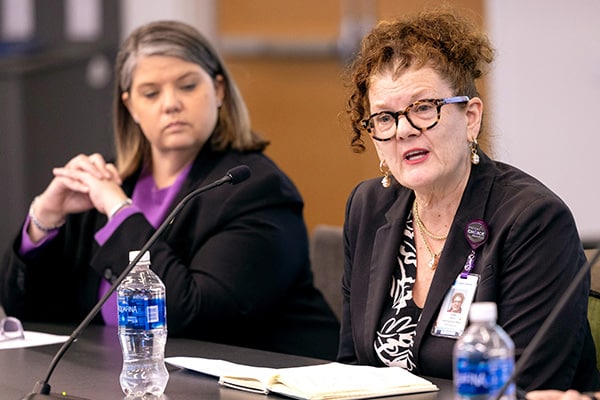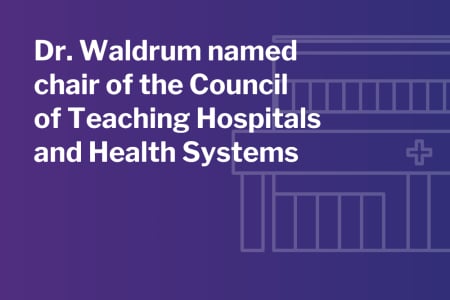Children and adolescents with mental health care needs will benefit from a $3.2 million partnership between East Carolina University and the United Health Foundation.
The grant will expand the North Carolina Statewide Telepsychiatry Program (NC-STeP) within the ECU Center for Telepsychiatry and e-Behavioral Health. The investment is part of the United Health Foundation’s ongoing commitment to working with ECU to address mental health challenges in North Carolina — this time with youth.
In joining leaders to announce the three-year partnership, North Carolina Gov. Roy Cooper highlighted the critical needs surrounding children’s mental health in the state.

“Not only do we need to pay attention to our health, but our mental health as well and we’re recognizing that more than ever,” Cooper said. “That’s why I am so excited that the United Health Foundation, Dr. Sy Saeed and ECU have come together to try to get mental health treatment to young people in a more efficient and better way.”
Cooper said the NC-STeP partnership between ECU and the United Health Foundation helps advance toward his mission for the state for people to be able to live healthier lives with opportunities of purpose and abundance. Cooper said residents of rural North Carolina know how hard it is to get access to health care. Telemedicine will help bring experts to people wherever they are throughout North Carolina.
“I’m excited about this project. There are going to be people’s lives improved and people’s lives saved because of it,” Cooper said.
Through this expanded program, NC-STeP will provide access to mental health services for children in their established pediatric or primary care setting, removing the stigma sometimes associated with mental health care, said Saeed, director of the ECU Center for Telepsychiatry and founding executive director of NC-STeP. Through telemedicine, the program will offer expert consultation support for clinicians.
“In North Carolina, children experience significant challenges accessing the care needed to address their mental health. More than 70% of children in North Carolina with a mental health disorder do not receive treatment, and 92 out of 100 counties in the state are designated as mental health professional shortage areas,” Saeed said. “A growing body of literature suggests that the use of telepsychiatry to provide mental health care has the potential to mitigate the workforce shortage that directly affects access to care, especially in remote and underserved areas.”
NC-STeP was established in 2013 and has completed more than 56,000 psychiatry assessments in hospital emergency departments and has served more than 14,000 patients in its 23-community primary care settings. The expansion will provide mental health care services to underserved children and adolescents in six community-based pediatric and primary care clinics in rural and underserved parts of the state.
U.S. Reps. Greg Murphy and Don Davis, who helped guide NC-SteP in the General Assembly, have continued to support the initiative in Congress.
“It’s the people with boots on the ground, the people who are actually taking care of patients who deserve most of the praise,” Murphy said. “Sy has been a lifesaver for many individuals.”
Murphy thanked United Health Foundation for funding the initiative that will help address the unique challenges of patients in rural areas.

Davis emphasized the focus on children’s mental health as an important step in the effort to “provide every child a fighting chance to realize the American dream in eastern North Carolina. Dr. Sy has been a fearless voice in this effort,” Davis said.
“We’re honored and excited to partner with East Carolina University to address key health challenges our young people are facing,” said Anita Bachmann, CEO, UnitedHealthcare Community Plan of North Carolina, part of UnitedHealth Group. “By working together and creating an interconnected system of clinical and social services, we can continue to produce better health outcomes for North Carolinians.”
The United Health Foundation and ECU also partnered in 2020 through a $1.25 million grant to expand telepsychiatry services to address the mental health needs of expectant and new mothers. Through the Maternal Outreach Using Telehealth for Rural Sites (MOTHeRs) project, ECU developed and deployed a new obstetric care model for high-risk patients and addressed food insecurity among pregnant women.
North Carolina Health and Human Services Secretary Kody Kinsley touted the importance of access to health care — particularly mental health care services — in rural North Carolina.
“There is no health without mental health,” Kinsley said. “In particular, I think we know that mental health needs for children are more acute than ever.”
Kinsley said the investment announced today is a “win-win-win.” The project is being built on a program that has led statewide in expanded access to care.
“Truly it has been ECU driving access to telepsychiatry far before it was a fashionable thing,” Kinsley said.
Innovation is at the center of ECU’s initiatives fostering regional transformation in health care. ECU Chancellor Philip Rogers said the partnership with the university and the United Health Foundation allows many disciplines across campus to address the disparities in health care.
Rogers said the initiative would not be possible without the steadfast dedication and hard work of leaders at ECU, beginning with Saeed, who leads the team responsible for the operational aspects of the program.
“This transformative grant builds on our leadership in leveraging technology to provide care in the region and across the state,” Rogers said. “Our partnership with the United Health Foundation runs quite deep. This partnership has already made a significant impact as we prepare students to address the critical shortage of mental health professionals in our state.”
“Lucky” Xue, Robert D. Teer Distinguished Professor, Department of Management Information Systems, and students in the ECU College of Business are responsible for two components of the project — a virtual reality video game (AI) and a knowledge management system (KM). Xue said the project would have a profound impact on her research, teaching and community engagement.
“The objective of the AI-KM component is to strengthen the collaboration among mental health care professionals, family members and community partners across eastern North Carolina, and to optimize the utilization of existing mental health knowledge while uncovering innovative practices,” Xue said.
“The students from the Department of Management Information Systems in the College of Business will be given the unique opportunity to participate in the system development process. This will serve as a practical application of the knowledge they have gained through their coursework and an opportunity to make a positive impact on society. It’s an excellent chance for them to hone their skills and contribute to a meaningful cause.”
Regional disparities
In North Carolina, children experience significant challenges accessing the care needed to address their mental health. This partnership will help connect youth with mental health services in areas with provider shortages, said Dave Tayloe Jr. at Goldsboro Pediatrics.
“We have a significant shortage of mental health professionals, and often these key members of our health care workforce are not paid enough to cover their expenses when they provide mental health services for at-risk children. Most communities do not have even one child psychiatrist to help primary care providers care for the children who have the most serious mental health problems,” Tayloe said. “We have seen great benefit from providing mental health educational courses for primary care health professionals, having mental health professionals who work in the schools, the primary care practice, and the community, and having access to telepsychiatry services for the children most at risk for adverse mental health outcomes.”
The new grant program will take about six months to prepare. Saeed said that through NC-STeP, ECU is serving others as the university’s mission calls it to do.
“Mental health — including psychological, emotional and social well-being — is a vital part of our overall health. This is especially true for children when we consider that for many adults with mental disorders, symptoms were present, but often not recognized or addressed, in childhood or adolescence,” he said. “The good news is that we live in times when the care for mental disorders has never been more effective.”
Read more from ECU News Services.
Student perseverance and community and industry partnerships were highlighted in special presentations at the East Carolina University Board of Trustees’ February meeting.
The board also welcomed Brandon Frye, vice chancellor for student affairs, who officially joined ECU this week.
On Thursday, four students spoke during the University Affairs Committee meeting about their struggles and how ECU programs helped them continue to move forward. The students and the programs are: George Cherry Jr., Students’ Treasure Chest; Nellyana Cordero-Cisnero, Pirate Promise; Adam Harrison, Pirate Academic Success Center; and Iyaira Williams, Purple Pantry. Chris Stansbury, associate vice chancellor and senior operating officer for student affairs, moderated the panel.

In introducing the students, Provost Robin Coger said earning a degree requires students to persevere even when faced with challenges. ECU provides a range of support for student success. “Ultimately they come out of ECU ready for successful careers, but there are a lot of steps in between,” she said.
Cherry, who is earning three degrees and plans to attend medical school, put 24,000 miles on his car driving to class last year from his Bertie County home, where he helps take care of his younger sister. He was able to get help from the Students’ Treasure Chest when his car needed repairs. He is working to give back to the university through service and his involvement in different organizations, including the Student Government Association.
Cordero-Cisnero is a first-generation student from Raleigh who attended community college before transferring to ECU for a degree in elementary education. She said an ECU alum introduced her to Pirate Promise, which gave her a path to a four-year degree. “It opened a new door for me,” she said.
Harrison said he commuted from his home in Williamston his first year, and the connections he made at the Pirate Academic Success Center helped him become a stronger student. He now is a mentor to other students at the center.
Williams, from Raleigh, has volunteered at the Purple Pantry since her freshman year. As an ambassador, she helped the organization win a collegiate hunger challenge and $10,000, and she continues to work with the pantry to combat food insecurity. A recent partnership with the SGA has yielded almost 90 meals donated from unused meal swipes. The SGA also provided funding to purchase a freezer for the pantry to provide frozen meals.
The panel encouraged trustees to continue hearing from students and provide opportunities for conversation. They also suggested continuing to bring awareness to the resources that ECU offers.
In another committee Thursday, the trustee’s Committee on Strategy and Innovation heard an industry workforce panel discuss how partnerships can lead to innovation and economic prosperity in eastern North Carolina and beyond. Participants included representatives from ECU Health, Fly Exclusive and MrBeast. Topics ranged from the importance of building and strengthening partnerships and pathways to identifying ECU student and graduate talent to recruit to their businesses.
Panelist Julie Oehlert, chief experience and brand officer at ECU Health, said both the university and the health system can benefit from working more closely to integrate student experiences into education in a wide variety of disciplines in health care and beyond.
“We share a community, we share learners that we both love deeply, in a variety of settings,” she said. “We share the responsibility of caring for eastern North Carolina; for educating eastern North Carolina and for advancing all the people that live in eastern North Carolina in their learning and in their health. That’s why we are ECU Health now; never before has the imperative for a strong partnership been more relevant or more necessary.”
The panelists and committee discussed ways to encourage partnerships based on innovation and thinking outside the box that will push students to create real-world solutions in situations that prepare them to enter the workforce with concrete foundational experience.
The committee also adopted a resolution on freedom of expression for faculty and students, which was unanimously approved by the full board on Friday. The resolution reaffirms the Board of Trustees’ commitment to academic freedom and freedom of expression in which faculty and students can “teach, learn, seek and speak the truth” in an environment where “academic freedom flourishes” and the campus community is given “the broadest possible latitude to speak, write, listen, challenge and learn except insofar as limitations to that freedom are necessary to the function of the university.”
Trustees also received an update on refreshing the university’s strategic plan. Committee co-chair Sharon Paynter presented a list of internal and external strengths, weaknesses, threats and opportunities that impact university initiatives and ways ECU leadership, faculty, staff and students continue to navigate them.
Read more from ECU News Services
Support, action and investment are needed in the East to solve what community members and experts alike are calling a mental health crisis across the region and state. That was the common theme at the Mental Health Town Hall in Greenville hosted by North Carolina Department of Health and Human Services (NCDHHS) Secretary Kody H. Kinsley and local legislators Feb. 9.
The bipartisan panel for the town hall featured Rep. Gloristine Brown, Sen. Jim Burgin, House Majority Leader John Bell, Rep. Dr. Tim Reeder and Sen. Kandie Smith, all of whom represent districts that fall within ECU Health’s 29-county service area. With more than 150 people in attendance, community members and representatives for local organizations shared their perspectives on mental health with the panel.
Kinsley said town halls are crucial to help him and other state officials understand the unique challenges in each area of the state.

“We are having mental health challenges all across the state, but every community is different because every community’s resources are different and their needs are different,” Kinsley said. “It’s really important to me as we set statewide policy that we’re doing it in a way that is informed by boots on the ground, and we heard a lot of that tonight, and we know we have a lot of work to do, and I’ve appreciated this conversation.”
Dr. Michael Lang, chair of the Department of Psychiatry & Behavioral Health at ECU Health and the Brody School of Medicine said the town hall was a positive step to help share with leaders what he and others are seeing locally. He said it was symbolic to bring the event to Greenville where he and his team see a disproportionate number of patients daily needing mental health resources at the ECU Health Medical Center Emergency Department.
“This was a great event for us overall,” Dr. Lang said. “We had a chance to meet our leadership from Raleigh and let them know about the issues and challenges we’re facing, not only here in eastern North Carolina but across the state. I can tell you firsthand we feel the impact of the mental health crisis here in the region and here in Greenville at the medical center. The challenges we’re talking about, such as a lack of access to resources and a dependence on emergency department visits for those suffering from mental health crises, are felt every day at hospitals across the region. That’s why it is important to focus on improving outpatient behavioral health resources to crate stable environments and prevent hospitalization.”
Officials noted there are at least 350 mental health patients in emergency departments across the state waiting for bed placement on any given day. The lack of access to care and resources are more magnified in rural areas such as eastern North Carolina where there is a disproportionate number of under or uninsured individuals. The bipartisan panel all agreed Medicaid expansion in North Carolina would help provide necessary resources towards solving the crisis and Sen. Burgin noted that Medicaid expansion would allow the state to spend more than $1 billion on improving access to behavioral health resources.
 “ECU Health is grateful for our local legislators who are committed to having these difficult but necessary conversations while at the same time pursuing common-sense solutions like Medicaid expansion,” said Brian Floyd, chief operating officer, ECU Health. “Medicaid expansion would help provide needed health coverage to 100,000 people in our region and improve the way we as a state deliver behavioral health resources.”
“ECU Health is grateful for our local legislators who are committed to having these difficult but necessary conversations while at the same time pursuing common-sense solutions like Medicaid expansion,” said Brian Floyd, chief operating officer, ECU Health. “Medicaid expansion would help provide needed health coverage to 100,000 people in our region and improve the way we as a state deliver behavioral health resources.”
At ECU Health, the system announced a partnership with Acadia Healthcare to build a state-of-the-art, 144-bed behavioral health hospital in the medical district of Greenville, less than a mile from ECU Health Medical Center.
The hospital, slated to open in 2025, will provide important access to behavioral health services for adults and pediatric patients, with 24 inpatient beds specifically for children and adolescents with mental health needs.
“I’m incredibly grateful for health systems that have been investing in building more behavioral health beds,” Kinsley said. “This is important but I have a job to do on this, too. We have got to increase [reimbursement] rates to help make those beds sustainable and used.”
Resources
Halifax, N.C. – ECU Health proudly joined community officials and business and health leaders at a Medicaid expansion roundtable hosted by U.S. Congressman Don Davis at the Halifax County Health Department Friday, Jan. 20, 2023, followed by a tour of ECU Health North Hospital.
Jay Briley, president of ECU Health community hospitals, and Jason Harrell, president of ECU Health North Hospital, attended the roundtable to offer insights on health issues impacting Halifax County and eastern North Carolina. Officials urged the need for Medicaid expansion, and community leaders offered perspective and insight on how to best advocate for expansion in North Carolina, which would provide invaluable health and economic benefits to communities across the region. With Medicaid expansion, more than 600,000 North Carolinians – 100,000 of whom live in eastern North Carolina – would have access to the affordable health care coverage they need.

“ECU Health is grateful for the opportunity to meet with Congressman Davis and other community leaders to discuss Medicaid expansion and other important health care needs for Halifax County and the region we so proudly serve,” said Briley. “Medicaid expansion is a crucial initiative that would provide numerous benefits for the state, and especially here in rural eastern North Carolina, where we see high rates of chronic diseases and high rates of uninsured patients. Simply put, Medicaid expansion would make an important difference in the lives of so many, and we are committed to advocating for this important measure.”
Following the roundtable, Briley and Harrell welcomed Congressman Davis to ECU Health North Hospital for a tour of the hospital, including the oncology unit and women and children’s unit. During the tour, the leaders discussed how Medicaid expansion and the Healthcare Access and Stabilization Program would help provide much-needed relief for rural hospitals across the state, ensuring that rural North Carolinians have access to high-quality health care.
“Rural hospitals like ECU Health North play a critical role in the communities they serve,” said Harrell. “Our hospital is not only a hub for high-quality care, but it is also the largest employer in the county. Medicaid expansion should be a top priority for the state, and we appreciate Congressman Davis’s efforts to advocate for the health and well-being of eastern North Carolina.”
Resources
Leaders from across eastern North Carolina came together for the Vision 2023 event hosted by NC East Alliance at the East Carolina Heart Institute on the Brody School of Medicine campus on Jan. 13 to collaborate on workforce development solutions for the region.
Titled “The Power of Possibility: Envisioning the Future of Rural Regional STEM Education,” the event focused on education and job training for the next generation of regional leaders. This served as the first planning meeting for the STEM East Network which aims to improve education, professional learning, workforce development and economic development in the East.
Dr. Michael Waldrum, chief executive officer at ECU Health and dean of the Brody School of Medicine at East Carolina University, is an NC East Alliance Executive Board member and said he believes the health system’s partnership with NC East Alliance is crucial to advancing the mission of ECU Health and the Brody School of Medicine.

“I’ve been on economic development company boards for over 25 years, and I always say if you really want to improve the health and well-being of a community, you have to drive economic development and if you want to drive economic development, you have to educate people,” Dr. Waldrum said. “It’s really a global perspective – regional transformation and promoting communities involves creating economic opportunities, educating future generations and providing great health care services.”
The event had representation from 29 school systems and 14 community colleges from across eastern North Carolina and the morning session centered on creating an “Industry in School” Alliance that brings together school districts, community colleges and industry in a collaboration designed to bolster the region’s workforce.
Mark Hamblin, chairman of the NC East Alliance, said this new initiative is an important next step for the organization and the region as a whole.
 “A couple years ago we were wondering what was next for this organization and when we came together to develop this initiative, it made so much sense because a regional approach is so important to all of us,” Hamblin said.
“A couple years ago we were wondering what was next for this organization and when we came together to develop this initiative, it made so much sense because a regional approach is so important to all of us,” Hamblin said.
The STEM East Network steering committee will develop regional solutions to help educators become transformative stakeholders in the regional economy. This will include training educators, from elementary school through college, to better understand the industry and workforce needs of the region. As a result, students will have an increased awareness of jobs available in the region.
A key vision for the program is to keep high school graduates in the region for work and further education while the ultimate goal is to encourage eastern North Carolina’s homegrown workforce to stay and serve in communities across the region.
Dr. Waldrum said for rural health care specifically, this initiative is much needed to develop a strong workforce of future regional leaders.
“In health care we need a strong workforce,” Dr. Waldrum said. “Before the pandemic, workforce was a major issue with massive shortages on technicians, nurses and physicians primarily in rural communities. So we focused on how we could recruit and retain our workforce and provide access to care for a vibrant, rural community. Having a group like this come together and help us in that sector with STEM education and economic development is something that I really want to thank everyone here for making happen.”
Forward thinking and grassroots efforts are helping shape a better future for eastern North Carolina and working together is the best way to impact the region far and wide. ECU Health is excited to partner with industry leaders and elected officials, joining forces on regional initiatives like the STEM East Network to promote positive change in the communities we serve.



Leaders of Pitt County’s Health Sciences Academy are working hard to give students the real-life skills needed to succeed in the work world—thus fueling the talent pipeline for our state’s employers.
While labor shortages have been prevalent across all industry sectors in recent years, it has been particularly acute in the health care industry and even more so in our state’s more rural communities. However, for Pitt County, this program has brought a tangible solution for training the next generation of health care talent in the Greenville area.
The Health Sciences Academy is a curriculum program, which was created to expose and prepare Pitt County high schoolers who wish to pursue a health care-related career after graduation.

During high school, students participating in the program complete a minimum of six courses that prepare them for various health careers. As part of their program experience, students can participate in job shadowing, mentoring, internships, medical research opportunities, career exploration, and volunteering at ECU Health. In addition to ECU Health, the school system works in tandem with East Carolina University Division of Health Sciences, Brody School of Medicine, the ECU Dental School of Medicine, Pitt Community College, Eastern Area Health Education Center, and the Greenville-Pitt County Chamber of Commerce.
“When people think of health care, they think of doctors and nurses,” said Reed Potts, Health Sciences Academy Coordinator. “Doctors and nurses only make up 30% of the health care workforce, so there are many more jobs out there that the kids do not know about.”
The program, which began in 2000, currently has approximately 1,000 student enrollees, and works with high school students exploring all pathways including two- and four-year colleges, trade school, the military, and others. Potts expressed pride that 30 members of the program’s current cohort will be first-generation college students.
“Seeing a career firsthand — you’ll know whether or not it’s for you,” said Lisa Lassiter, director of workforce development at ECU Health. “We had a student who was set on being a labor and delivery nurse, but after a firsthand experience through Health Sciences Academy, she adamantly decided it was not for her anymore. That’s valuable too, because if she hadn’t had that opportunity, she never would have known until her junior year of college during clinicals.”
Potts said that standalone career nights are extremely beneficial to recruiting future students into the program because they can touch, see, and feel medical equipment and talk to staff about potential careers firsthand. They are also now starting recruitment efforts even earlier among middle schoolers.
To participate in the Health Sciences Academy, students must maintain a 3.0 GPA, have a clean disciplinary record and complete 25 hours of volunteer hours per year. There are also two dedicated counselors that work directly with Health Sciences Academy students and travel to all of Pitt County high schools.
In this program, students learn many soft or durable skills, including leadership, critical thinking, accountability, and communication, and they also get other important training such as etiquette lessons, resume building, and ACT and SAT workshops.
Potts stated that there has been a major return on investment as this program expands the talent pipeline in the Greenville area. “Roughly 50% of the students who go through the Health Sciences Academy stay in the area and go to East Carolina University,” he said. “And we anticipate seeing that number go up even more.”
He also attested that every single student who goes through the program goes to a two- to four-year college, trade school or the military.
When asked what recommendations they would make to other counties looking to implement similar programs, both Potts and Lassiter discussed the importance of constant two-way dialogue between the health system and school system, to ensure the needs of both parties are being met.
“Having direct communication with the school system has been extremely beneficial because we can discuss what’s going great and how to mitigate certain challenges,” said Lassiter. “As a result, we have this very well-trained future pipeline.”
She also stated that many people may be turned off by the cost of a similar program but suggested that other schools and health systems can start small by using time as a resource or having exposure activities that do not cost money.
Read more on NCChamber.com.
Greenville, N.C. – ECU Health, the premier health system serving eastern North Carolina, experienced a transformational year highlighted by the introduction of a new brand, announcement of a new behavioral health hospital, recognition of multiple team members on the state and national levels and realization of clinical achievements and innovations that enhance the care for the 1.4 million people the organization proudly serves.
“As we reflect on the historic year that was and celebrate our achievements, I want to take a moment to extend my heartfelt gratitude to the team members who make ECU Health what it is: a premier rural academic health system dedicated to serving the people who call eastern North Carolina home,” said Dr. Michael Waldrum, ECU Health CEO and Dean of the Brody School of Medicine. “As one year comes to a close and another begins, I know the next chapter of our shared story will be just as important. Our efforts in 2022 helped position us to navigate the complex challenges we face moving forward by bringing clinical, education and research innovations, but we still have work to do in the upcoming year and beyond to ensure our communities have access to the high-quality care they deserve.”

The following highlights are only a few of the many achievements across ECU Health in 2022. For a more comprehensive review of the year, please visit: ECUHealth.org/YearinReview2022
Evolving to ECU Health
The re-brand to ECU Health is a visual reminder of how transformative the year has been. The ECU Health logo is a symbol of the commitment to transforming and elevating health care for millions, training the providers of tomorrow, collaborating with community partners to solve complex issues and bringing clinical innovations that improve the lives of those who call this region home.
The Brody School of Medicine at East Carolina University and the health system began a joint operating agreement on Jan. 1, 2022. In April, the two organizations hosted a press conference and shared the new logo for ECU Health and announced the brand launch that would begin in May.
In the months since, there have been visual changes across the health system from signage around hospitals and clinics to websites and social media channels. More importantly, the creation of ECU Health has opened the door for the system to improve access to care across eastern North Carolina while training health care professionals through Brody.
Expanding access to behavioral health care in eastern North Carolina
Access to behavioral health care is crucial across the country, but especially in rural areas like eastern North Carolina. In June, ECU Health and Acadia Healthcare announced plans to build a state-of-the-art, 144-bed behavioral health hospital in the medical district of Greenville, less than a mile from ECU Health Medical Center.
Slated to open in spring 2025, the hospital will operate through a joint venture between ECU Health and Acadia, the largest standalone provider of behavioral health care services across the United States. Together, the organizations will invest approximately $65 million in expanding behavioral health resources in eastern North Carolina.
The hospital will include 24 inpatient beds specifically for children and adolescents with mental health needs. These beds will be the first of their kind in ECU Health’s 29-county service area and the only child and adolescent beds within 75 miles of Greenville, North Carolina.
Twenty-two ECU Health nurses recognized among Great 100 Nurses of North Carolina
This year, 22 ECU Health nurses were selected to the 2022 NC Great 100. This is the largest number of ECU Health nurses to receive this recognition. The honorees were celebrated at a gala hosted by The North Carolina Great 100, Inc. in Greenville in October.
Since 1989, The North Carolina Great 100, Inc. has recognized and honored nurses around the state for their commitment to excellence and to promote a positive image of the nursing profession. Out of thousands of nominations that are submitted annually, 100 recipients are selected based on their outstanding professional abilities and contributions made to improving health care services to their communities.
ECU Health Beaufort Hospital designated as primary stroke center by The Joint Commission
In July, ECU Health Beaufort Hospital – a campus of ECU Health Medical Center was designated as a primary stroke center by The Joint Commission and the American Heart/Stroke Association, recognizing the hospital’s preparedness and expertise to care for stroke patients. Stroke is one of the leading causes of death in the state, resulting in more serious long-term disabilities than any other disease.
With ECU Health Beaufort’s designation, all ECU Health’s hospitals are stroke certified by The Joint Commission.
The holiday season brings so much joy, especially for young children and their families that get to see them light up as they unwrap presents.
While picking out toys that young ones will love, it is also important to consider the safety of the toy, Ellen Walston, Injury Prevention Program coordinator at ECU Health Medical Center, said.
In 2021, there were more than 152,000 toy-related, emergency department-treated injuries to children under the age of 15, according to the Consumer Product Safety Commission.
“I think the thing is, because of COVID and supply chain issues, a lot of parents have a lot of pressure on that perfect gift,” Walston said. “But you don’t need to sacrifice safety.”

Walston noted toys with many pieces and stuffed animals with poorly sewn features as choking hazards for small children. A good test, she said, would be to use a toilet tissue roll to see what kinds of items might be a choking hazard for a child. If it could get stuck in a toilet tissue roll, it could be ingested and become a choking hazard.
She said often older children and younger children in the same home can play with different toys that may be safer for the older child than the younger child. It is important to remind older children to put away toys when they are done using them to make sure younger children cannot get hurt using that toy or ingesting pieces.
A key concern each year, though, is button batteries, Walston said. Button batteries can be found in many objects around a home, including car key fobs, thermometers, scales and some remotes. These can also be found in books that play music and many singing cards. Walston said if a child gets to these batteries, it can be very dangerous — not only as a choking hazard, but also the possibility for chemical burns from the battery.
Last, Walston reminded anyone purchasing a bike for a child to not forget a helmet and bell or another item that makes noise.
Walston said it all comes down to making educated choices and supervising young children while they play to keep them safe and avoiding an emergency.
“Please make sure that you’re paying attention to labels,” Walston said. “If a toy says ‘not recommended for a child under three years of age,’ you have to take those warnings seriously. Also, supervision is critical and just making sure that children are safe when they’re playing.”
Keeping children safe with their toys helps ensure a happy holiday season for all.
Resources
Greenville, N.C. – Dr. Michael Waldrum, CEO of ECU Health and dean of the Brody School of Medicine at East Carolina University, assumed the role as chair of the Council of Teaching Hospitals and Health Systems (COTH) Administrative Board for the Association of American Medical Colleges (AAMC), effective Nov. 12, 2022. In addition to his chair role, Dr. Waldrum is also a voting member of the AAMC Board of Directors.
COTH members include CEOs, presidents, and other executives who lead the AAMC’s nearly 400-member teaching hospitals and health systems. They concentrate on issues specific to academic medicine, such as demonstrating its value and societal good; financing graduate medical education; funds flow and enterprise-wide mission alignment. Dr. Waldrum is a leading voice in advocating for policies promoting and enhancing academic health care and in particular, rural academic health care.

“Dr. Waldrum has clearly earned the respect of hospital executives and leaders in academic medicine across the country as he was selected for this leadership role by his peers,” said Rosha McCoy, MD, AAMC acting chief health care officer. “As an AAMC council, COTH is one of the crucial professional development groups for the association, bringing together the highest tiers of leadership from academic medical centers. Dr. Waldrum has shown a deep commitment to patients and communities, with a particular focus on rural communities, a passion for academic medicine, and an excellent ability to navigate tough challenges. We are thrilled to have him as chair of the COTH Administrative Board and look forward to working with him over the coming year.”
Health care in America faces significant and unique challenges and it’s even more difficult in rural areas of the country where 183 hospitals have closed their doors since 2005, according to a recent UNC Sheps Center report. The impacts of a global pandemic combined with a high burden of disease, vast geographical areas, traditionally underserved communities and a high reliance on government pay requires innovative solutions, difficult decisions and importantly, the need to develop and train health professionals committed to rural health care. In eastern North Carolina, academic medicine is how ECU Health strives to sustain quality rural health care now and into the future and achieve its vision to become the national model for rural health care.
“It’s an honor to work collaboratively with other leaders across the nation who are committed and passionate about academic health care,” said Dr. Waldrum. “I understand the important responsibility and opportunity I have to highlight and advocate for the future of health care in rural America. I appreciate my peers for entrusting me with the opportunity to bring my unique perspective to the AAMC Council of Teaching Hospitals and Health Systems.”
The AAMC leads and serves the academic medicine community to improve the health of people everywhere. Founded in 1876 and based in Washington, D.C., the AAMC is a not-for-profit association dedicated to transforming health through medical education, health care, medical research, and community collaborations.
ECU Health Beaufort Hospital, a campus of ECU Health Medical Center, hosted free community health screenings, produce giveaways and educational information at its first fall harvest event at the new community garden and outdoor classroom on Nov. 18.
The community garden and outdoor classroom, located next to the ECU Health Wellness Center in Washington was made possible — in part — by a grant from the Robert Wood Johnson Foundation and the garden was developed by the ECU Health Patient Education team in collaboration with ECU Health Beaufort Hospital. Internal partners include the ECU Health Beaufort Hospital Food & Nutrition Services team, Community Health Improvement team, Volunteer Services, the Wellness Center, and Facilities & Properties.
“It has been wonderful working with such an innovative team,” said Tammy Thompson, director of Experience Engagement, Education and Design at ECU Health. “They have been true partners throughout entire process.”

Sowing the seeds for health and well-being
Over the summer, the garden started to take shape, resulting in 10 raised beds for vegetables, two large metal planters for herbs, fencing, a shed and space for community members to come together and learn outdoors. The hospital planted the first crops in September for the first harvest event.
Pam Shadle, director of Marketing, Community Outreach and Development at ECU Health Beaufort Hospital, said the opportunity to come together as a team and create something that will benefit the community has been a great experience.
“It’s been a labor of love since the creation of the idea,” Shadle said. “So many of our team members from various departments came together to make this happen, so it’s been a great opportunity for our folks to get involved and I really appreciate that.”
Shadle said the community garden and outdoor classroom is an integral addition to their community health improvement plan for Beaufort and Hyde county residents. While they already feel the great impact of existing programs on community health, the garden will help create new opportunities and help improve those established programs, Shadle said.
Beyond the harvest
The ECU Health Food and Nutrition Services team joined the event and shared easy-to-make recipes inspired by the garden’s produce — which includes vegetables and herbs like broccoli, collards, kale, lettuce, rosemary and thyme. Along with the opportunity to take home fresh, free produce, clinical teams were on hand to offer health screenings for community members, and the Wellness Center team shared information about lifestyle medicine and other services to support community wellness.
“It’s just a great complement to include these offerings because what we’re trying to do is not solely about food,” Dr. Thompson said. “We call these living-learning labs because of the interactive engagement to support healthy lifestyles. This is an opportunity for community members to receive a variety of information and resources for better health.”
ECU Health Chief Experience Officer Julie Oehlert, DNP, RN, said the garden is an important step in the community health work in eastern North Carolina.

“We’re so proud of the teams that made this garden a reality,” Dr. Oehlert said. “It’s going to benefit community members, team members and patients in the hospital and I think it’s really special for us to connect with the communities we serve in this way. We’re excited to offer something unique for Washington and Beaufort County and I know we’re going to learn so much from this project.”
Planning your visit
The garden will be open to community members from 9 a.m. to noon each Wednesday and Friday where any produce ready to be harvested will be distributed and other educational materials will be shared.